Items
Contributor is exactly
Jen Rodriguez
-
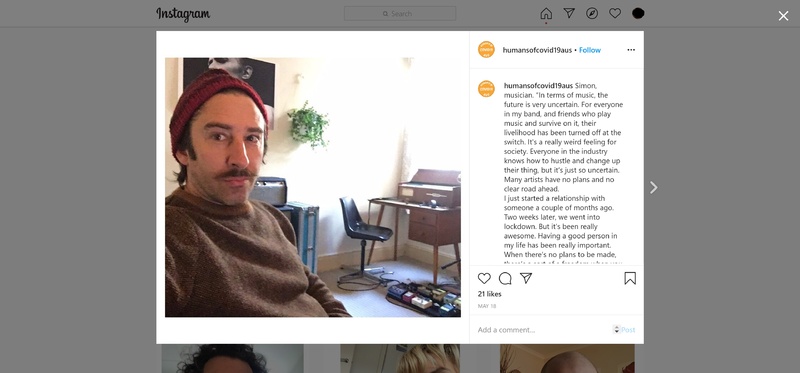 2020-05-18
2020-05-18Humans of Covid-19 AU: Simon
“In terms of music, the future is very uncertain. For everyone in my band, and friends who play music and survive on it, their livelihood has been turned off at the switch. It's a really weird feeling for society. Everyone in the industry knows how to hustle and change up their thing, but it’s just so uncertain. Many artists have no plans and no clear road ahead. I just started a relationship with someone a couple of months ago. Two weeks later, we went into lockdown. But it’s been really awesome. Having a good person in my life has been really important. When there’s no plans to be made, there’s a sort of a freedom when you can just focus on the day. It is nice to make everything small like that - focusing on the 14-16 waking hours and not expecting too much out of them. Simplicity has been getting me through this. The pot plants are getting a fair amount of attention...” Instagram post on Simon, musician, and his experience during the pandemic, which was created by a psychology student living in Melbourne who was interested to hear about how COVID-19 was impacting on different peoples’ lives. -
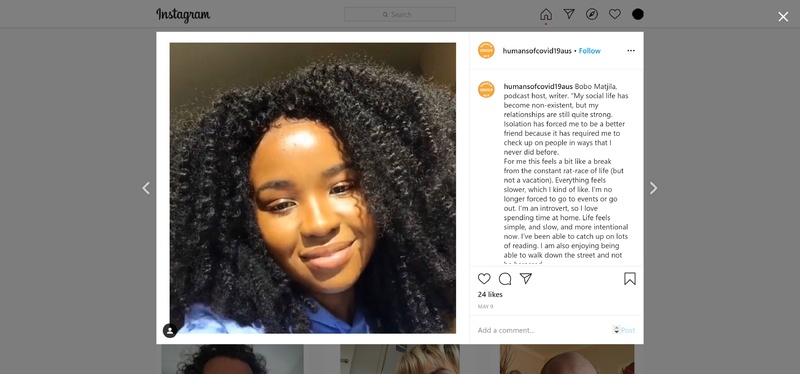 2020-05-09
2020-05-09Humans of Covid-19 AU: Bobo Matjila
“My social life has become non-existent, but my relationships are still quite strong. Isolation has forced me to be a better friend because it has required me to check up on people in ways that I never did before. For me this feels a bit like a break from the constant rat-race of life (but not a vacation). Everything feels slower, which I kind of like. I’m no longer forced to go to events or go out. I'm an introvert, so I love spending time at home. Life feels simple, and slow, and more intentional now. I’ve been able to catch up on lots of reading. I am also enjoying being able to walk down the street and not be harassed. I expected something like this to happen sooner or later. I always had the sense that the pace at which this city runs is not sustainable, so pretty soon it will collapse. I've been mentally and emotionally prepared for this to happen. Everyday people are dying, suffering, and in the depths of misery, which I feel is the norm of the human condition. Peace is the exception. I think that’s why I’m mentally not so affected by the pandemic, because I don't have hopeful expectations for humanity. If we all agreed on the basics that homelessness and suffering is unnecessary, then we could get rid of all of this in a couple of months and save the future of humanity. There’s a lot we can do to prevent this, I just don't think we will do it.” Instagram post on Bobo Matjila, podcast host & writer, and her experience during the pandemic, which was created by a psychology student living in Melbourne who was interested to hear about how COVID-19 was impacting on different peoples’ lives. -
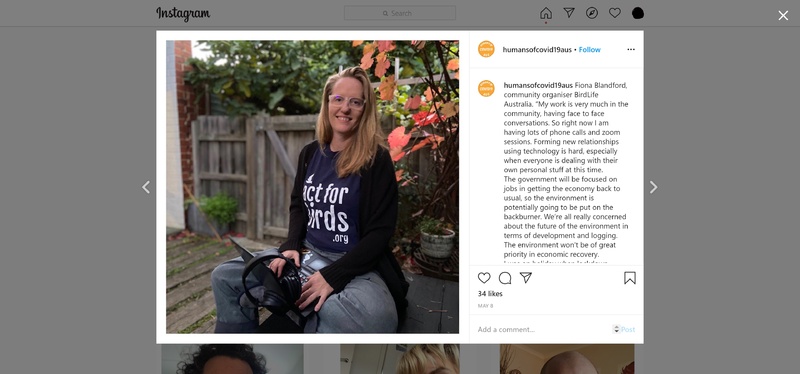 2020-05-08
2020-05-08Humans of Covid-19 AU: Fiona Blandford
“My work is very much in the community, having face to face conversations. So right now I am having lots of phone calls and zoom sessions. Forming new relationships using technology is hard, especially when everyone is dealing with their own personal stuff at this time. The government will be focused on jobs in getting the economy back to usual, so the environment is potentially going to be put on the backburner. We’re all really concerned about the future of the environment in terms of development and logging. The environment won't be of great priority in economic recovery. I was on holiday when lockdown started. Coming back to Melbourne was pretty shocking, and I was initially grieving the way things used to be. We’ve been doing lots of checking in with each other and touching base, which is really important but also exhausting. We were talking about Covid non-stop for 2-3 weeks. I'm getting better at not talking about it. I feel lucky to have a home, a great relationship with my partner and a job. We need to remember to have gratitude whilst dealing with everything else going on.” Instagram post on Fiona Blandford, community organizer of BirdLife Australia, and her experience during the pandemic, which was created by a psychology student living in Melbourne who was interested to hear about how COVID-19 was impacting on different peoples’ lives. -
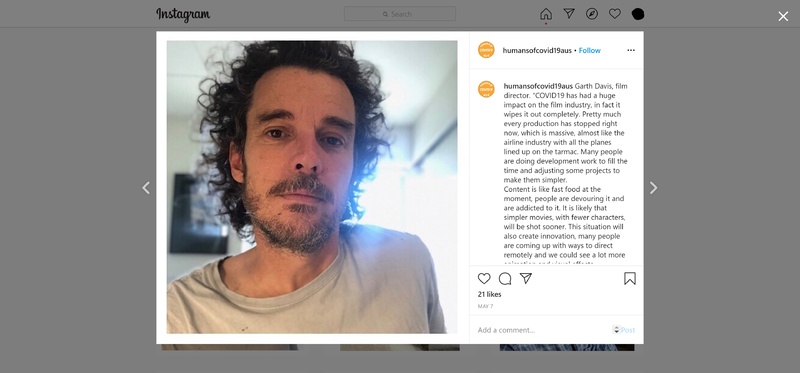 2020-05-07
2020-05-07Humans of Covid-19 AU: Garth Davis
“COVID19 has had a huge impact on the film industry, in fact it wipes it out completely. Pretty much every production has stopped right now, which is massive, almost like the airline industry with all the planes lined up on the tarmac. Many people are doing development work to fill the time and adjusting some projects to make them simpler. Content is like fast food at the moment, people are devouring it and are addicted to it. It is likely that simpler movies, with fewer characters, will be shot sooner. This situation will also create innovation, many people are coming up with ways to direct remotely and we could see a lot more animation and visual effects. For me, films are always ahead of reality. There are so many movies about COVID19 already, look at Contagion, almost bizarrely similar - it's crazy! This event may inspire people to connect more to the story they are telling. Some of the greatest art has come from moments of trauma and difficulty. Sometimes such circumstances can push out really inventive, amazing things. This virus is a dress rehearsal for what is really coming, one of the offspring of our journey to the elephant in the room, which is global warming. We do have the capacity to act as one people and work together globally. There is hope - but we need to get ahead of this, not be reactionary.” Instagram post on Garth Davis, film director, and his experience during the pandemic, which was created by a psychology student living in Melbourne who was interested to hear about how COVID-19 was impacting on different peoples’ lives. -
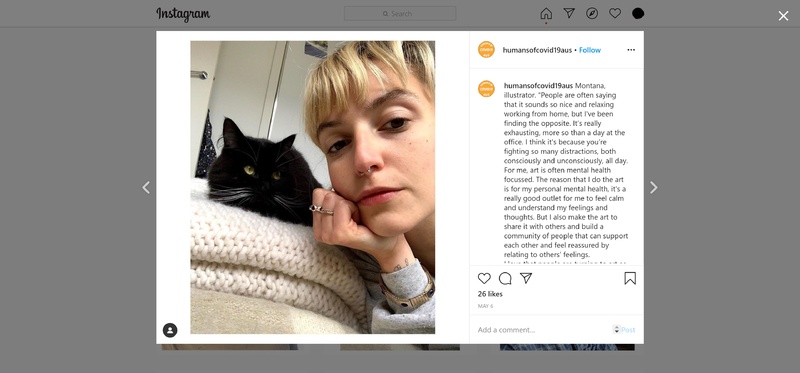 2020-05-06
2020-05-06Humans of Covid-19 AU: Montana
“People are often saying that it sounds so nice and relaxing working from home, but I've been finding the opposite. It’s really exhausting, more so than a day at the office. I think it's because you’re fighting so many distractions, both consciously and unconsciously, all day. For me, art is often mental health focused. The reason that I do the art is for my personal mental health, it's a really good outlet for me to feel calm and understand my feelings and thoughts. But I also make the art to share it with others and build a community of people that can support each other and feel reassured by relating to others’ feelings. I love that people are turning to art as an outlet during this time. I'm a big believer that creativity can help people to reach a state of mindfulness and act as a preventative measure to mental health issues. I’ve noticed that people are being so generous and compassionate. As I go for walks, I notice that people have got baskets out on the nature-strip, offering their things, and sending letters to each other. It’s really wholesome. COVID19 has made me realize that there are so many things we do everyday that contribute to the decay of earth, but are completely unnecessary.” Instagram post on Montana, illustrator, and her experience during the pandemic, which was created by a psychology student living in Melbourne who was interested to hear about how COVID-19 was impacting on different peoples’ lives. -
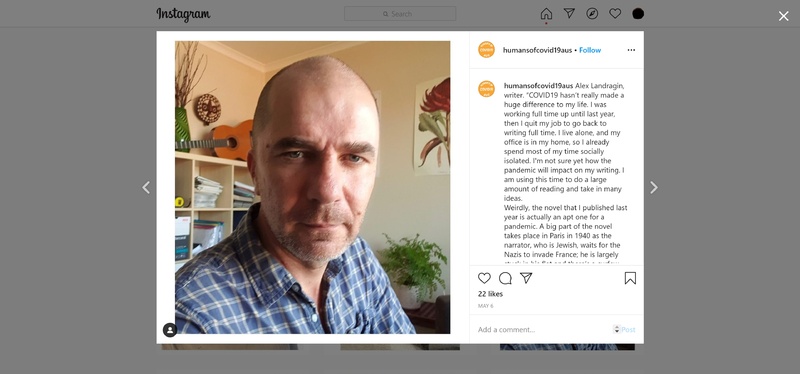 2020-05-06
2020-05-06Humans of Covid-19 AU: Alex Landragin
“COVID19 hasn’t really made a huge difference to my life. I was working full time up until last year, then I quit my job to go back to writing full time. I live alone, and my office is in my home, so I already spend most of my time socially isolated. I'm not sure yet how the pandemic will impact on my writing. I am using this time to do a large amount of reading and take in many ideas. Weirdly, the novel that I published last year is actually an apt one for a pandemic. A big part of the novel takes place in Paris in 1940 as the narrator, who is Jewish, waits for the Nazis to invade France; he is largely stuck in his flat and there’s a curfew going on. So in a way, my novel reflects the current reality. Sometimes a silver lining doesn’t justify the damage caused by the thunderstorm. But I hope that this pandemic will lead to a recalibration of our priorities, away from a fantasy happiness bubble living beyond our needs. I hope the return to scarcity will be accompanied by a return to cooperation, mutual assistance, empathy. Some of those values that we associate with helping each other through tough times I've been making a concerted effort to not rely too much on technology. I’ve made a deliberate decision to read more and I hope this quarantine will lead to a revival in interesting reading for all. I've been reading a book that was written almost 100 years ago. The main message I've taken from the book is that you’re never going to get used to this. The only thing you can do is get used to not getting used to it.” Instagram post on Alex Landragin, writer, and his experience during the pandemic, which was created by a psychology student living in Melbourne who was interested to hear about how COVID-19 was impacting on different peoples’ lives. -
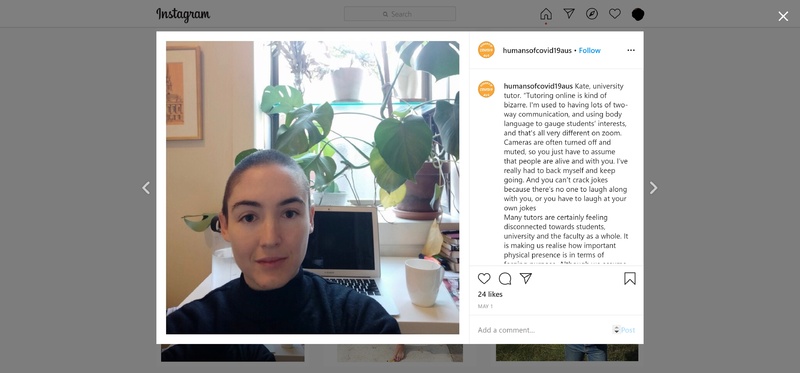 2020-05-01
2020-05-01Humans of Covid-19 AU: Kate
“Tutoring online is kind of bizarre. I'm used to having lots of two-way communication, and using body language to gauge students’ interests, and that's all very different on zoom. Cameras are often turned off and muted, so you just have to assume that people are alive and with you. I’ve really had to back myself and keep going. And you can’t crack jokes because there’s no one to laugh along with you, or you have to laugh at your own jokes Many tutors are certainly feeling disconnected towards students, university and the faculty as a whole. It is making us realise how important physical presence is in terms of forging purpose. Although we assume we are superior to the natural world, COVID19 is forcing people to realise the fragility of our systems. The shut down of certain supply chains has revealed how interconnected everything is. It has also forced us to understand what we need to live, rather than what we want to live - it has made us all question what our actual basic necessities are versus our learned needs. People's behaviour has become more environmental by accident. We just need to hope that there is not a slingshot back to old habits.” Instagram post on Kate, university tutor, and her experience during the pandemic, which was created by a psychology student living in Melbourne who was interested to hear about how COVID-19 was impacting on different peoples’ lives. -
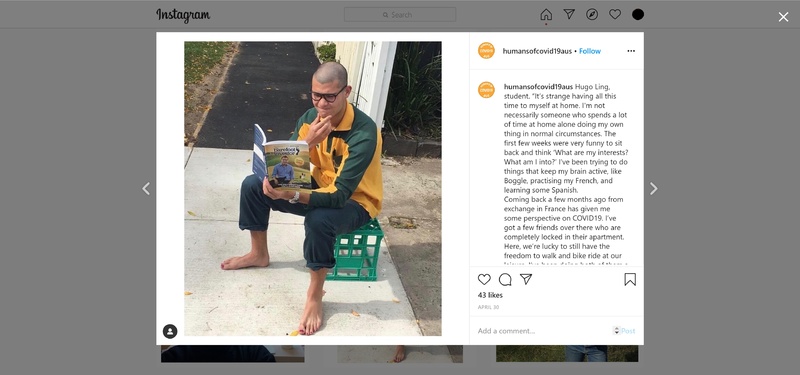 2020-04-30
2020-04-30Humans of Covid-19 AU: Hugo Ling
“It’s strange having all this time to myself at home. I'm not necessarily someone who spends a lot of time at home alone doing my own thing in normal circumstances. The first few weeks were very funny to sit back and think ‘What are my interests? What am I into?’ I’ve been trying to do things that keep my brain active, like Boggle, practising my French, and learning some Spanish. Coming back a few months ago from exchange in France has given me some perspective on COVID19. I’ve got a few friends over there who are completely locked in their apartment. Here, we’re lucky to still have the freedom to walk and bike ride at our leisure. I’ve been doing both of them a lot. Earlier in the pandemic, everyone was talking about ‘social distancing’. My mum pointed out that the better term is ‘physical distancing’. You don't want to be socially distant, you want to be socially connected, with a distance - something that me and my friends have maintained. I’ve been feeding off the creativity of some of my friends: weekly Zoom live music; a home-made magazine; a friend is making Vino Quarantino. So there are a few things that have been happening amongst my close circle that keep us all talking, interested and connected. We’ll definitely carry the habit of diligent handwashing into the future, and a greater consideration for general hygiene. The pandemic has definitely sparked that in my house. I get bouts of cabin fever from time to time, but am trying to keep busy and active.” Instagram post on Hugo Ling, student, and his experience during the pandemic, which was created by a psychology student living in Melbourne who was interested to hear about how COVID-19 was impacting on different peoples’ lives. -
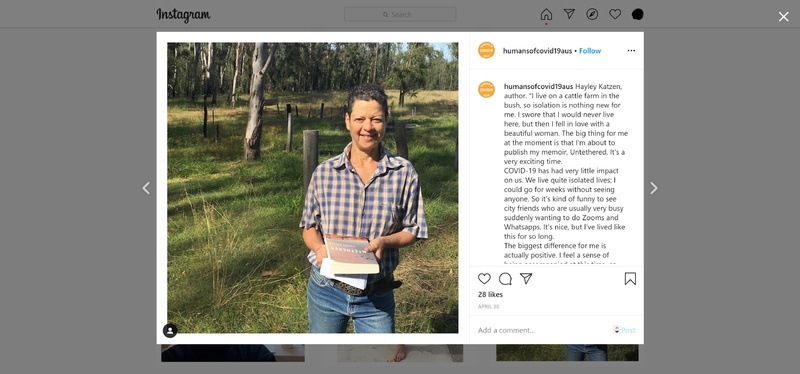 2020-04-30
2020-04-30Humans of Covid-19 AU: Hayley Katzen
“I live on a cattle farm in the bush, so isolation is nothing new for me. I swore that I would never live here, but then I fell in love with a beautiful woman. The big thing for me at the moment is that I'm about to publish my memoir, Untethered. It's a very exciting time. COVID-19 has had very little impact on us. We live quite isolated lives; I could go for weeks without seeing anyone. So it’s kind of funny to see city friends who are usually very busy suddenly wanting to do Zooms and Whatsapps. It’s nice, but I’ve lived like this for so long. The biggest difference for me is actually positive. I feel a sense of being accompanied at this time, as everyone is now living as I have been living. Often, over the years, I have felt quite lonely and struggled with the isolation, as do so many people. Now we are all in this. Adjusting to isolation is a deeply personal process. We all need to find what delights us and add it to our days. As I have compromised immunity, I have to wear a mask when going out. It feels very strange going to the supermarket and not being able to connect with anyone. I’ve been dealing with ovarian cancer treatment, so there is an uncertainty to my future. At this time, when the whole world is dealing with anxiety and uncertainty, there’s a universality to this shared experience. I find this intriguing at one level, and also feel incredibly lucky to be where I am. What most interests me is what we will put back into the world after this. My life won't change significantly. But in terms of our fragile planet, what will people do to take care of it?” Instagram post on Hayley Katzen, author, and their experience during the pandemic, which was created by a psychology student living in Melbourne who was interested to hear about how COVID-19 was impacting on different peoples’ lives. -
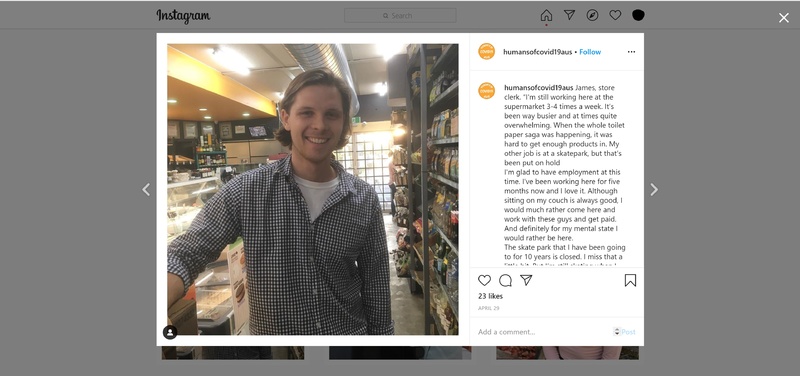 2020-04-29
2020-04-29Humans of Covid-19 AU: James
“I'm still working here at the supermarket 3-4 times a week. It’s been way busier and at times quite overwhelming. When the whole toilet paper saga was happening, it was hard to get enough products in. My other job is at a skatepark, but that’s been put on hold I'm glad to have employment at this time. I’ve been working here for five months now and I love it. Although sitting on my couch is always good, I would much rather come here and work with these guys and get paid. And definitely for my mental state I would rather be here. The skate park that I have been going to for 10 years is closed. I miss that a little bit. But I’m still skating when I can. I’m looking forward to being able to see my mates. Zoom calls are not the same. It’s weird, you never would have thought you’d appreciate it so much.” Instagram post on James, store clerk, and his experience during the pandemic, which was created by a psychology student living in Melbourne who was interested to hear about how COVID-19 was impacting on different peoples’ lives. -
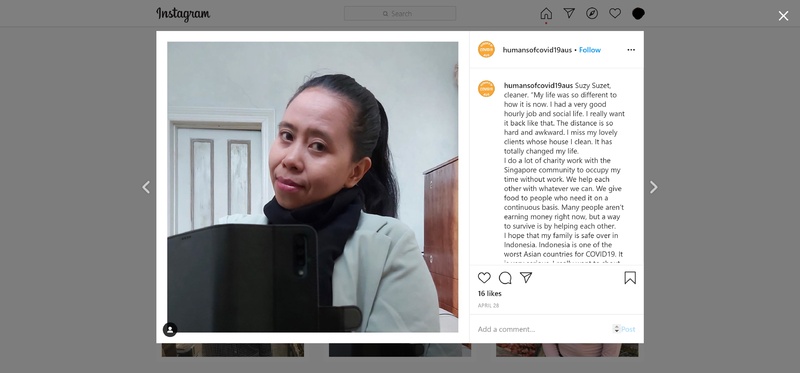 2020-04-28
2020-04-28Humans of Covid-19 AU: Suzy Suzet
“My life was so different to how it is now. I had a very good hourly job and social life. I really want it back like that. The distance is so hard and awkward. I miss my lovely clients whose house I clean. It has totally changed my life. I do a lot of charity work with the Singapore community to occupy my time without work. We help each other with whatever we can. We give food to people who need it on a continuous basis. Many people aren’t earning money right now, but a way to survive is by helping each other. I hope that my family is safe over in Indonesia. Indonesia is one of the worst Asian countries for COVID19. It is very serious. I really want to shout out to my people “this is the worst thing and listen to the government’s warnings!”. I always remind my family: stay at home. Don't worry about food or money, I will provide. Just don’t step outside the house. I really appreciate the Australian Government, they are doing the best. The cases have slowed down, and there has been a good response and togetherness from all of the people. We must always be aware of what the government is saying. Always listen and do it, it’s not that hard. This is not a holiday, lock down is lock down. I have to go outside to make money. The rest are very lucky to work from home.” Instagram post on Suzy Suzet, cleaner, and her experience during the pandemic, which was created by a psychology student living in Melbourne who was interested to hear about how COVID-19 was impacting on different peoples’ lives. -
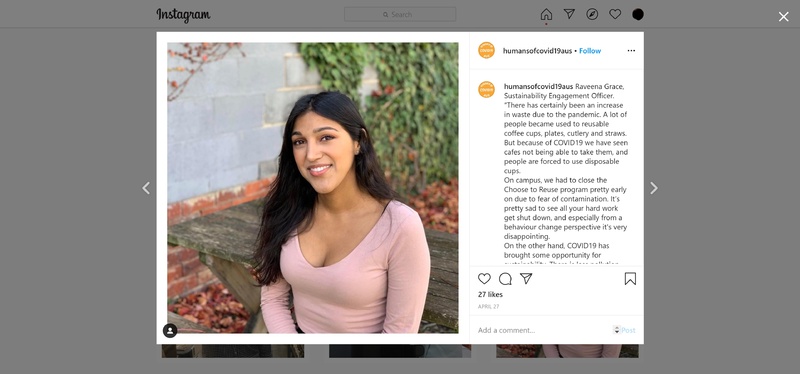 2020-04-27
2020-04-27Humans of Covid-19 AU: Raveena Grace
“There has certainly been an increase in waste due to the pandemic. A lot of people became used to reusable coffee cups, plates, cutlery and straws. But because of COVID19 we have seen cafes not being able to take them, and people are forced to use disposable cups. On campus, we had to close the Choose to Reuse program pretty early on due to fear of contamination. It’s pretty sad to see all your hard work get shut down, and especially from a behaviour change perspective it's very disappointing. On the other hand, COVID19 has brought some opportunity for sustainability. There is less pollution on the roads; more people are beginning to see that they can work from home; and people are appreciating nature more. There are many things people can do to improve their sustainability at home. For example, plants are really positive not only for health and wellbeing, but also for the environment and brightening the workspace. Either people will gain a really strong appreciation for nature, and an awareness that we are not invincible. Or people will not connect the links between COVID-19 and the environment, and continue taking earth for granted. If we don't learn from our mistakes about how to be kind to the earth, we’re just going to face the same issues again.” Instagram post on Raveena Grace, Sustainability Engagement Officer, and her experience during the pandemic, which was created by a psychology student living in Melbourne who was interested to hear about how COVID-19 was impacting on different peoples’ lives. -
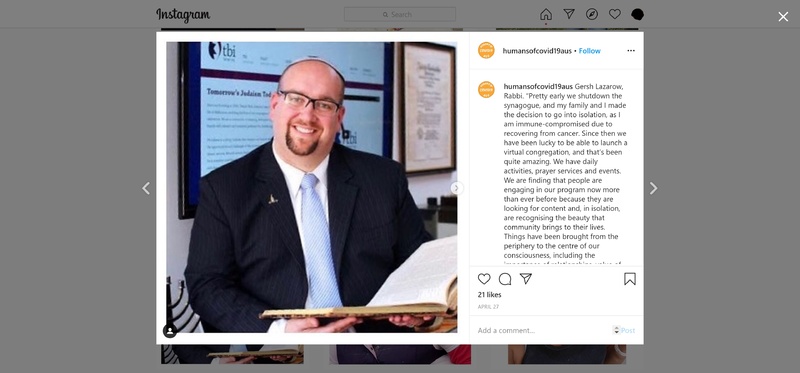 2020-04-27
2020-04-27Humans of Covid-19 AU: Gersh Lazarow
“Pretty early we shutdown the synagogue, and my family and I made the decision to go into isolation, as I am immune-compromised due to recovering from cancer. Since then we have been lucky to be able to launch a virtual congregation, and that’s been quite amazing. We have daily activities, prayer services and events. We are finding that people are engaging in our program now more than ever before because they are looking for content and, in isolation, are recognising the beauty that community brings to their lives. Things have been brought from the periphery to the centre of our consciousness, including the importance of relationships, value of community, sense of connectedness - many things that we take for granted until they are taken away. As a rabbi, my tradition is a great source of comfort to me, inspiring me to find paths to continue, rather than to stop Jewish life, just as past leaders have done over our long 4,000 year history. The synagogue may be shut, but our community never closes. We accept the need for social distancing but reject any possibility for social isolation. This year we added a paper clip to the Passover seder plate as a symbol of life right now. COVID-19 has required from us immense flexibility: the ability to bend and turn, but like the paper clip, the capacity to hold us together. The colour of the traditional paper clip, silver, is also symbolic, representing that even in this chaos there are silver linings, such as time, awakenings, valuable lessons, great blessings.” Instagram post on Gersh Lazarow, Rabbi, and his experience during the pandemic, which was created by a psychology student living in Melbourne who was interested to hear about how COVID-19 was impacting on different peoples’ lives. -
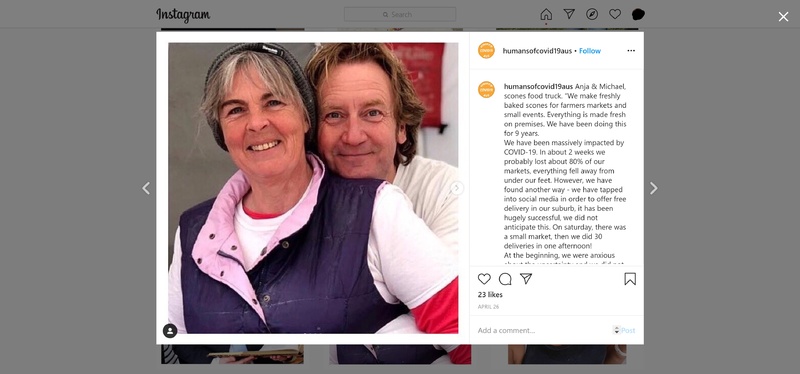 2020-04-26
2020-04-26Humans of Covid-19 AU: Anja & Michael
“We make freshly baked scones for farmers markets and small events. Everything is made fresh on premises. We have been doing this for 9 years. We have been massively impacted by COVID-19. In about 2 weeks we probably lost about 80% of our markets, everything fell away from under our feet. However, we have found another way - we have tapped into social media in order to offer free delivery in our suburb, it has been hugely successful, we did not anticipate this. On saturday, there was a small market, then we did 30 deliveries in one afternoon! At the beginning, we were anxious about the uncertainty and we did not know if we could continue with the business at all. The uncertainty was the worst. Also the timeframe was challenging, we were supposed to be working at a market in the Dandenongs for 30 days continuously. But that was cancelled. So all our business calculations were thrown out. All my family is in Germany, which is quite tough at the moment. There’s a lot that I'm missing out on. Sometimes life throws you curveballs, and you just have to deal with it.” Instagram post on Anja & Michael, scones food truck, and their experience during the pandemic, which was created by a psychology student living in Melbourne who was interested to hear about how COVID-19 was impacting on different peoples’ lives. -
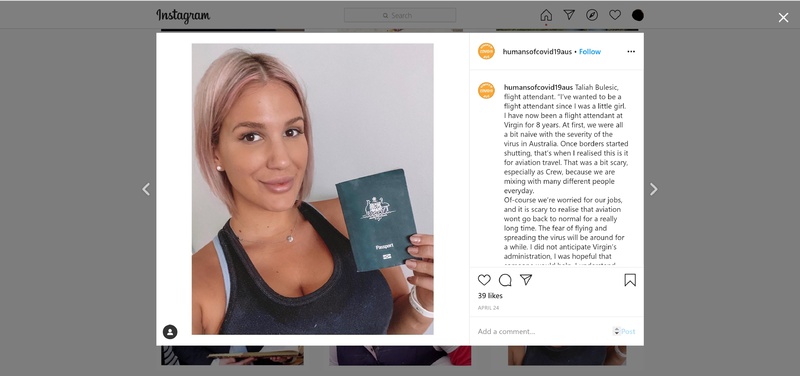 2020-04-24
2020-04-24Humans of Covid-19 AU: Taliah Bulesic
“I’ve wanted to be a flight attendant since I was a little girl. I have now been a flight attendant at Virgin for 8 years. At first, we were all a bit naive with the severity of the virus in Australia. Once borders started shutting, that’s when I realised this is it for aviation travel. That was a bit scary, especially as Crew, because we are mixing with many different people everyday. Of-course we’re worried for our jobs, and it is scary to realise that aviation wont go back to normal for a really long time. The fear of flying and spreading the virus will be around for a while. I did not anticipate Virgin’s administration, I was hopeful that someone would help. I understand why the Government said no to a bail out. They are doing what they can, but it was disappointing from a staff perspective to not see help come through. The culture at Virgin is something I've never experienced before. It is different from other airlines. We’ve all come together and really supported each other, which has helped with the mental health of many staff. Everyone is very optimistic, and our CEO is confident we will be able to get out of this. There’s a real never giving up attitude. I never thought I would live to see something like this. You have days when you get upset, ‘a selfish moment’, when you think about your life and how it has changed. But I try to educate myself about what else is going on around the world, and it makes me appreciate where we are. I love flying, but I've stuck it out for 8 years because of who I work for. I think it would be a huge culture shock moving airlines, and it won’t happen anytime soon. But who knows, maybe one day - aviation is in your blood.” Instagram post on Taliah Bulesic, flight attendant, and her experience during the pandemic, which was created by a psychology student living in Melbourne who was interested to hear about how COVID-19 was impacting on different peoples’ lives. -
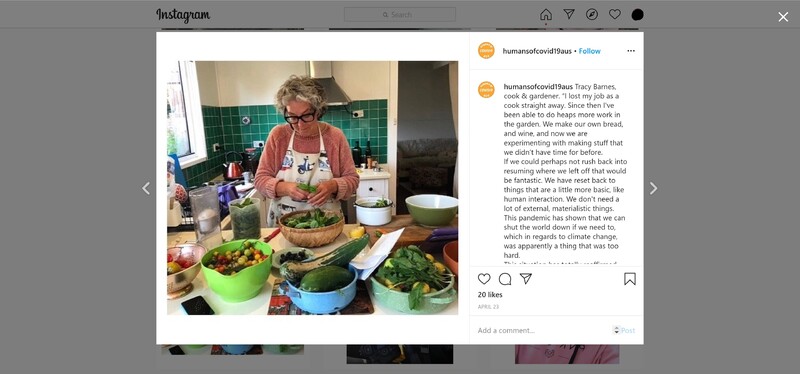 2020-04-23
2020-04-23Humans of Covid-19 AU: Tracy Barnes
“I lost my job as a cook straight away. Since then I've been able to do heaps more work in the garden. We make our own bread, and wine, and now we are experimenting with making stuff that we didn’t have time for before. If we could perhaps not rush back into resuming where we left off that would be fantastic. We have reset back to things that are a little more basic, like human interaction. We don't need a lot of external, materialistic things. This pandemic has shown that we can shut the world down if we need to, which in regards to climate change, was apparently a thing that was too hard. This situation has totally reaffirmed the importance of gardening and self-sufficiency. We have been able to provide for others around us. We have a chance to take a breath in history. Hopefully it can be a turning point that where we were going isn’t the way we had to go and we can look back and say ‘Wow, we actually changed the direction we were heading’”. Instagram post on Tracy Barnes, cook & gardener, and her experience during the pandemic, which was created by a psychology student living in Melbourne who was interested to hear about how COVID-19 was impacting on different peoples’ lives. -
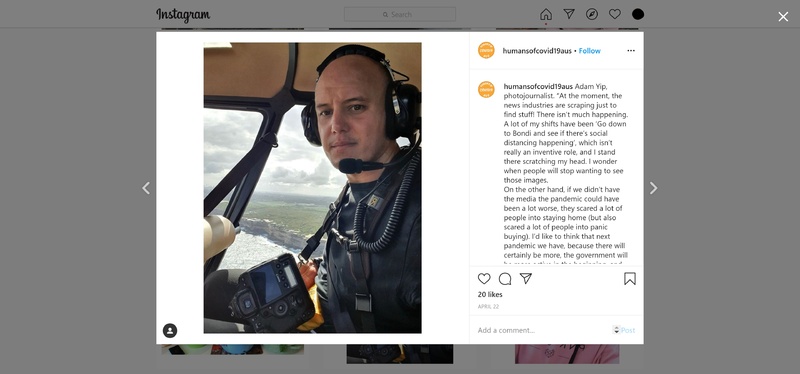 2020-04-22
2020-04-22Humans of Covid-19 AU: Adam Yip
“At the moment, the news industries are scraping just to find stuff! There isn’t much happening. A lot of my shifts have been ‘Go down to Bondi and see if there’s social distancing happening’, which isn’t really an inventive role, and I stand there scratching my head. I wonder when people will stop wanting to see those images. On the other hand, if we didn’t have the media the pandemic could have been a lot worse, they scared a lot of people into staying home (but also scared a lot of people into panic buying). I’d like to think that next pandemic we have, because there will certainly be more, the government will be more active in the beginning, and have everything ready to go. Also, I hope that people will stop panic buying and being so selfish. The scenes of people fighting over toilet paper are horrible. I’m lucky to be in photojournalism though because a lot of other freelance photographers are really suffering at the moment. I used to do lots of portrait shots, but haven’t done one in a while.” Instagram post on Adam Yip, photojournalist, and his experience during the pandemic, which was created by a psychology student living in Melbourne who was interested to hear about how COVID-19 was impacting on different peoples’ lives. -
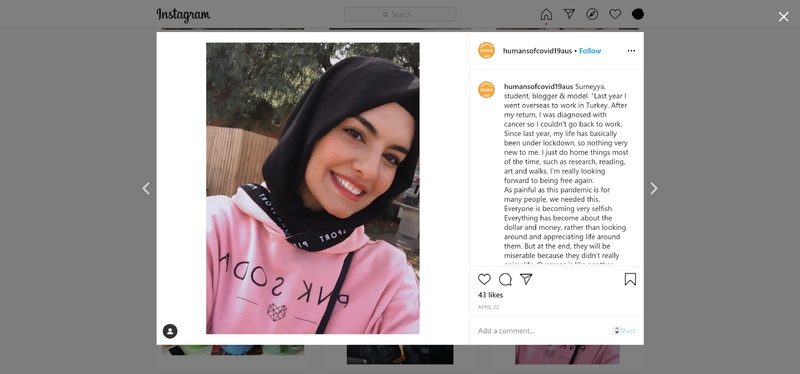 2020-04-22
2020-04-22Humans of Covid-19 AU: Sumeyya
“Last year I went overseas to work in Turkey. After my return, I was diagnosed with cancer so I couldn't go back to work. Since last year, my life has basically been under lockdown, so nothing very new to me. I just do home things most of the time, such as research, reading, art and walks. I’m really looking forward to being free again. As painful as this pandemic is for many people, we needed this. Everyone is becoming very selfish. Everything has become about the dollar and money, rather than looking around and appreciating life around them. But at the end, they will be miserable because they didn’t really enjoy life. Overseas is like another world, especially in poor countries. But no one stops to think about how these people are surviving. Ramaddan is in a few days' time. There is a mixture of excitement and nervousness. It will be hard because we can’t visit friends and family, or have meals together with lots of people. But a lot of people are working on keeping it positive. This year we can pray just with our family, and it is still rewarding. As hard as this time is, we are going to be part of history!” Instagram post on Sumeyya, student, blogger & model, and her experience during the pandemic, which was created by a psychology student living in Melbourne who was interested to hear about how COVID-19 was impacting on different peoples’ lives. -
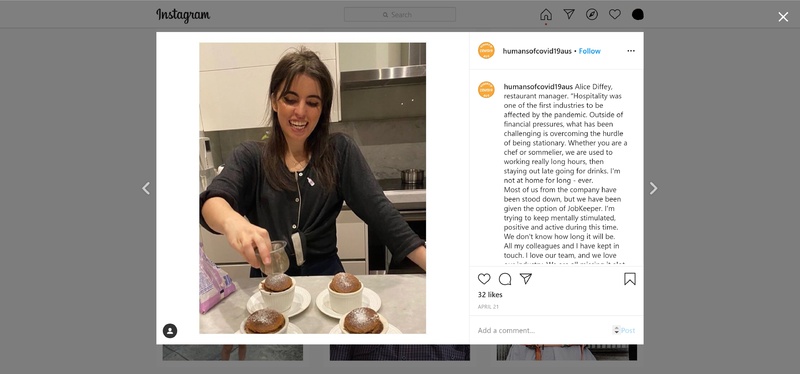 2020-04-21
2020-04-21Humans of Covid-19 AU: Alice Diffey
“Hospitality was one of the first industries to be affected by the pandemic. Outside of financial pressures, what has been challenging is overcoming the hurdle of being stationary. Whether you are a chef or sommelier, we are used to working really long hours, then staying out late going for drinks. I'm not at home for long - ever. Most of us from the company have been stood down, but we have been given the option of JobKeeper. I’m trying to keep mentally stimulated, positive and active during this time. We don't know how long it will be. All my colleagues and I have kept in touch. I love our team, and we love our industry. We are all missing it alot. In hospitality, you form very tight friendships and bonds, you go out with these people, work with these people - they become your family. It’s a massive blow because our whole industry is about bringing people together, creating culture and stories that will last forever. You can’t do that when you’re by yourself at home.” Instagram post on Alice Diffey, restaurant manager, and her experience during the pandemic, which was created by a psychology student living in Melbourne who was interested to hear about how COVID-19 was impacting on different peoples’ lives. -
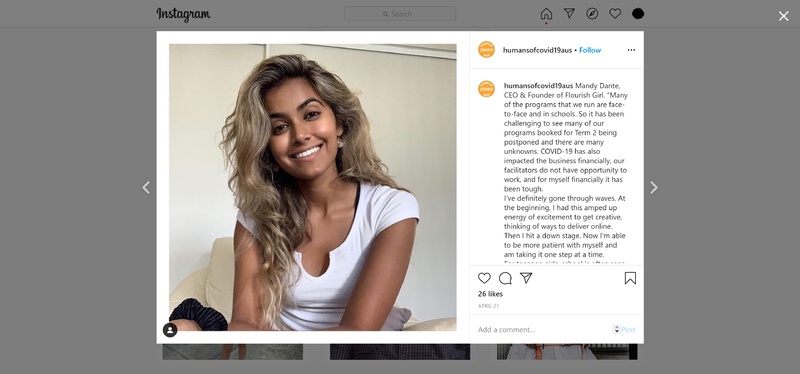 2020-04-21
2020-04-21Humans of Covid-19 AU: Mandy Dante
“Many of the programs that we run are face-to-face and in schools. So it has been challenging to see many of our programs booked for Term 2 being postponed and there are many unknowns. COVID-19 has also impacted the business financially, our facilitators do not have opportunity to work, and for myself financially it has been tough. I’ve definitely gone through waves. At the beginning, I had this amped up energy of excitement to get creative, thinking of ways to deliver online. Then I hit a down stage. Now I'm able to be more patient with myself and am taking it one step at a time. For teenage girls, school is often seen as an escape from home life and family. It's a different world for them, and so not having that outlet and freedom is difficult. Also in your teenage years, your friendship group is like your bloodline, so lack of physical connection is definitely having an impact. It is ok to ride different emotions at this strange time. I realize that even I am on social media so much more! This, combined with having more alone time, can amplify people’s thoughts about body image and friendships. There is pressure to be constantly posting and being relatable. A huge thing people are learning is to be grateful for the small things. This period is enabling a space to develop intentional communication, rather than quick, rushed conversation. It is fostering deeper connections.” Instagram post on Mandy Dante, CEO & Founder of Flourish Girl, and her experience during the pandemic, which was created by a psychology student living in Melbourne who was interested to hear about how COVID-19 was impacting on different peoples’ lives. -
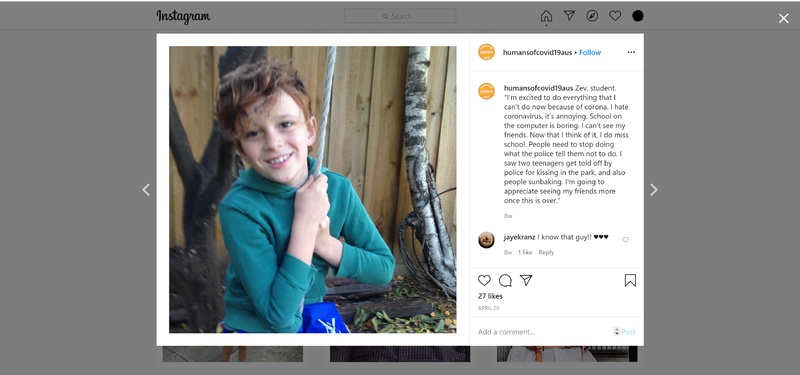 2020-04-20
2020-04-20Humans of Covid-19 AU: Zev
“I’m excited to do everything that I can’t do now because of corona. I hate coronavirus, it’s annoying. School on the computer is boring. I can’t see my friends. Now that I think of it, I do miss school. People need to stop doing what the police tell them not to do. I saw two teenagers get told off by police for kissing in the park, and also people sunbaking. I'm going to appreciate seeing my friends more once this is over.” Instagram post on Zev, a student, and their experience during the pandemic, which was created by a psychology student living in Melbourne who was interested to hear about how COVID-19 was impacting on different peoples’ lives. -
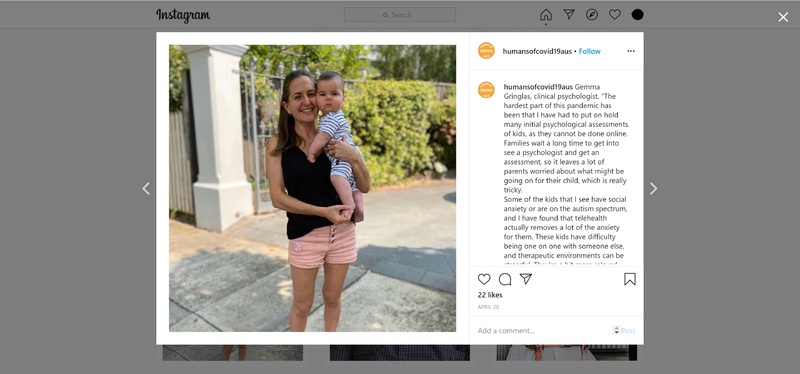 2020-04-20
2020-04-20Humans of Covid-19 AU: Gemma Gringlas
“The hardest part of this pandemic has been that I have had to put on hold many initial psychological assessments of kids, as they cannot be done online. Families wait a long time to get into see a psychologist and get an assessment, so it leaves a lot of parents worried about what might be going on for their child, which is really tricky. Some of the kids that I see have social anxiety or are on the autism spectrum, and I have found that telehealth actually removes a lot of the anxiety for them. These kids have difficulty being one on one with someone else, and therapeutic environments can be stressful. They’re a bit more relaxed when on screen because they’re slightly removed from me, which is really interesting. Everyone is being responsive to the difficulty of working at home. I'm trying to see my clients in the time when Teddy is sleeping. We’ve all had to learn to adapt. I am very concerned about the general mental health of people in society. People have lost connection, their social interaction, their daily scheduling, and also financial stress and uncertainty. As a society, it’s important to reach out. We need to take care of one another during this time.” Instagram post on Gemma Gringlas, clinical psychologist, and her experience during the pandemic, which was created by a psychology student living in Melbourne who was interested to hear about how COVID-19 was impacting on different peoples’ lives. -
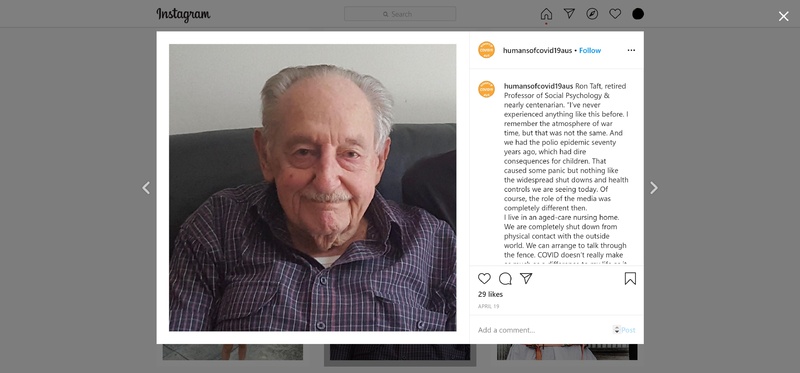 2020-04-19
2020-04-19Humans of Covid-19 AU: Ron Taft
“I’ve never experienced anything like this before. I remember the atmosphere of war time, but that was not the same. And we had the polio epidemic seventy years ago, which had dire consequences for children. That caused some panic but nothing like the widespread shut downs and health controls we are seeing today. Of course, the role of the media was completely different then. I live in an aged-care nursing home. We are completely shut down from physical contact with the outside world. We can arrange to talk through the fence. COVID doesn’t really make as much as a difference to my life as it does to younger people, who are used to being out and about. I’m actually having more communication now with family and friends than I had previously. Maybe the exceptional circumstances mean people want to reach out; could be having more time on one’s hands. Mobile phones are having a huge impact on people’s lives. I feel quite healthy. I survived a haematoma a couple of years ago. All going well, I turn 100 in about six weeks. The world has changed so very greatly over the century of my life.” Instagram post on Ron Taft, retired Professor of Social Psychology & nearly centenarian, and his experience during the pandemic, which was created by a psychology student living in Melbourne who was interested to hear about how COVID-19 was impacting on different peoples’ lives. -
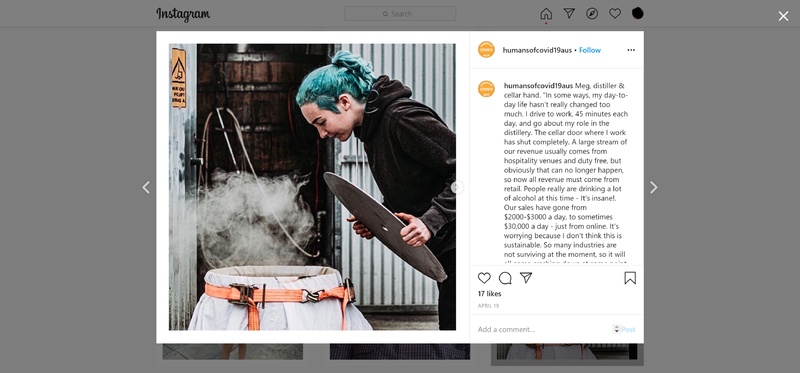 2020-04-19
2020-04-19Humans of Covid-19 AU: Meg
“In some ways, my day-to-day life hasn’t really changed too much. I drive to work, 45 minutes each day, and go about my role in the distillery. The cellar door where I work has shut completely. A large stream of our revenue usually comes from hospitality venues and duty free, but obviously that can no longer happen, so now all revenue must come from retail. People really are drinking a lot of alcohol at this time - It's insane!. Our sales have gone from $2000-$3000 a day, to sometimes $30,000 a day - just from online. It’s worrying because I don't think this is sustainable. So many industries are not surviving at the moment, so it will all come crashing down at some point, it’s just unclear when. Not being able to go out is not the end of the world. Social media is amazing in this sense. I’m managing to stay connected with my friends and family. Tuesday night is quiz night that my mum organises, then Wednesday night is family sit-down dinner. Last year I was in a car accident and it taught me that I needed to slow down and enjoy my life. And this is another reminder that I need to be grateful for everything happening around me. I have picked up hobbies that I had put aside for a while, because I didn’t have time. A lot more creativity is coming back into my life that I love and had really missed. People are being a lot more compassionate and supportive of each other. It has restored a little bit of my faith in humanity.” Instagram post on Meg, distiller & cellar hand, and her experience during the pandemic, which was created by a psychology student living in Melbourne who was interested to hear about how COVID-19 was impacting on different peoples’ lives. -
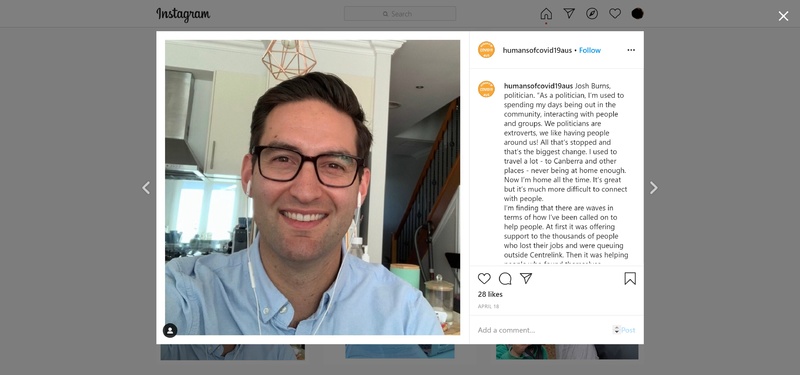 2020-04-18
2020-04-18Humans of Covid-19 AU: Josh Burns
“As a politician, I’m used to spending my days being out in the community, interacting with people and groups. We politicians are extroverts, we like having people around us! All that’s stopped and that’s the biggest change. I used to travel a lot - to Canberra and other places - never being at home enough. Now I’m home all the time. It’s great but it’s much more difficult to connect with people. I’m finding that there are waves in terms of how I’ve been called on to help people. At first it was offering support to the thousands of people who lost their jobs and were queuing outside Centrelink. Then it was helping people who found themselves stranded overseas. Now it’s about assisting individuals and businesses in accessing grants. The financial strain is immense, but it’s also about people’s sense of self worth. The mental health issues are huge. With so much hardship and such dramatic changes, my work is harder but it’s also meaningful. What’s next? How do we unlock the next chapter? There are so many approaches about what we should be doing at this moment. We need a clear government strategy for now before we can work out next steps. But we have to keep going.” Instagram post on Josh Burns, a politician, and his experience during the pandemic, which was created by a psychology student living in Melbourne who was interested to hear about how COVID-19 was impacting on different peoples’ lives. -
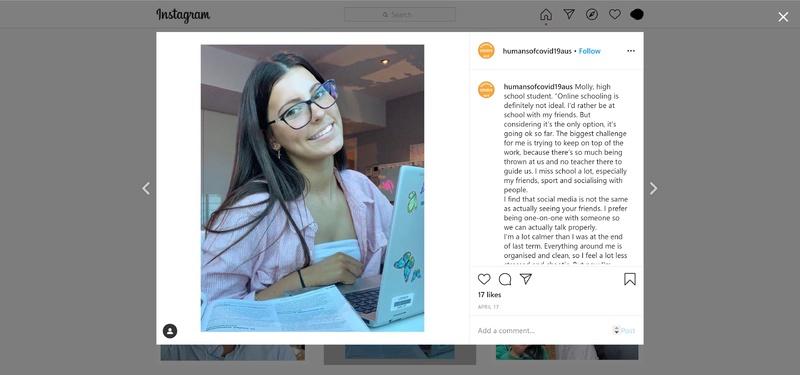 2020-04-17
2020-04-17Humans of Covid-19 AU: Molly
“Online schooling is definitely not ideal. I’d rather be at school with my friends. But considering it’s the only option, it’s going ok so far. The biggest challenge for me is trying to keep on top of the work, because there’s so much being thrown at us and no teacher there to guide us. I miss school a lot, especially my friends, sport and socialising with people. I find that social media is not the same as actually seeing your friends. I prefer being one-on-one with someone so we can actually talk properly. I’m a lot calmer than I was at the end of last term. Everything around me is organised and clean, so I feel a lot less stressed and chaotic. But now I'm ready for my life to go back to normal.” Instagram post on Molly, a high school student, and her experience during the pandemic, which was created by a psychology student living in Melbourne who was interested to hear about how COVID-19 was impacting on different peoples’ lives. -
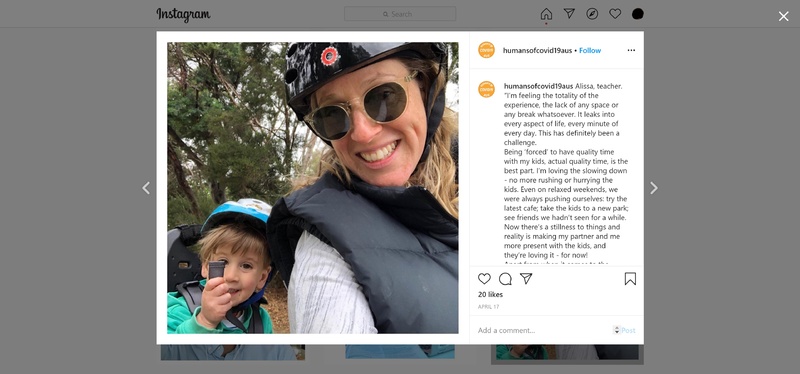 2020-04-17
2020-04-17Humans of Covid-19 AU: Alissa
“I’m feeling the totality of the experience, the lack of any space or any break whatsoever. It leaks into every aspect of life, every minute of every day. This has definitely been a challenge. Being ‘forced’ to have quality time with my kids, actual quality time, is the best part. I’m loving the slowing down - no more rushing or hurrying the kids. Even on relaxed weekends, we were always pushing ourselves: try the latest cafe; take the kids to a new park; see friends we hadn’t seen for a while. Now there’s a stillness to things and reality is making my partner and me more present with the kids, and they’re loving it - for now! Apart from when it comes to the phone… that’s almost become a source of evil, with too much going on. I’m trying to put it aside when I can.” Instagram post on Alissa, a teacher, and her experience during the pandemic, which was created by a psychology student living in Melbourne who was interested to hear about how COVID-19 was impacting on different peoples’ lives. -
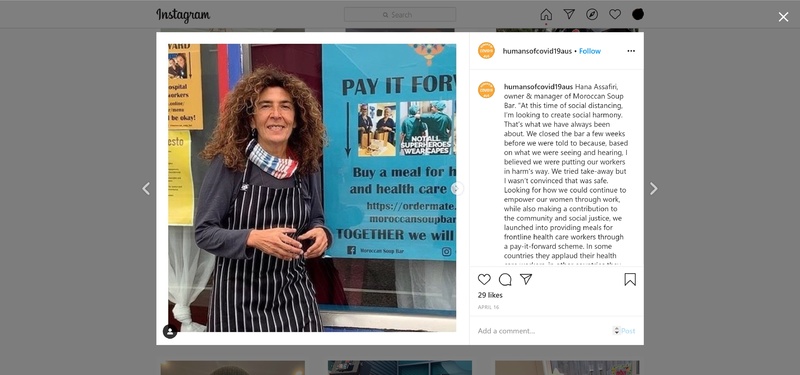 2020-04-16
2020-04-16Humans of Covid-19 AU: Hana Assafiri
“At this time of social distancing, I’m looking to create social harmony. That’s what we have always been about. We closed the bar a few weeks before we were told to because, based on what we were seeing and hearing, I believed we were putting our workers in harm’s way. We tried take-away but I wasn’t convinced that was safe. Looking for how we could continue to empower our women through work, while also making a contribution to the community and social justice, we launched into providing meals for frontline health care workers through a pay-it-forward scheme. In some countries they applaud their health care workers, in other countries they sing for them. In Melbourne, it’s all about the food, so it makes sense we feed them! Everything is cause and effect. This pandemic didn’t just ‘happen’, nor was it dropped on us by aliens. It is a consequence of how we live in the world, our disregard for animals and the environment. We must take heed of what got us here and change the conversation, rather than just thinking we are going to ‘snap back’. Our behaviours and attachments came to an abrupt halt. I’m already seeing a change in attitudes. It’s about harnessing this and taking this opportunity to reset our values and activate our citizenship to work towards a more harmonious society. Almost all of those doing the thinking and leading are men. Women know how to heal with heart and compassion. We need to respect that contribution, not take it for granted.” Instagram post on Hanna, owner & manager of Moroccan Soup Bar, and her experience during the pandemic, which was created by a psychology student living in Melbourne who was interested to hear about how COVID-19 was impacting on different peoples’ lives. -
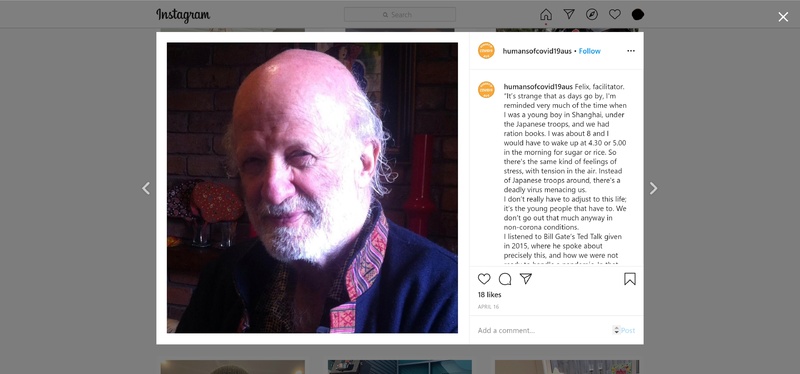 2020-04-16
2020-04-16Humans of Covid-19 AU: Felix
“It’s strange that as days go by, I'm reminded very much of the time when I was a young boy in Shanghai, under the Japanese troops, and we had ration books. I was about 8 and I would have to wake up at 4.30 or 5.00 in the morning for sugar or rice. So there's the same kind of feelings of stress, with tension in the air. Instead of Japanese troops around, there's a deadly virus menacing us. I don’t really have to adjust to this life; it’s the young people that have to. We don’t go out that much anyway in non-corona conditions. I listened to Bill Gate’s Ted Talk given in 2015, where he spoke about precisely this, and how we were not ready to handle a pandemic. In that sense, some knowledgeable people could have predicted this. In terms of immensity, this is probably one of the biggest possible events imaginable.” Instagram post on Felix, a facilitator, and his experience during the pandemic, which was created by a psychology student living in Melbourne who was interested to hear about how COVID-19 was impacting on different peoples’ lives. -
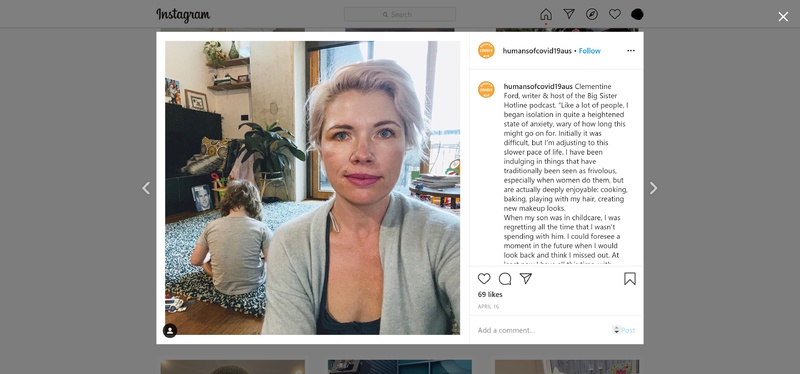 2020-04-16
2020-04-16Humans of Covid-19 AU: Clementine Ford
“Like a lot of people, I began isolation in quite a heightened state of anxiety, wary of how long this might go on for. Initially it was difficult, but I’m adjusting to this slower pace of life. I have been indulging in things that have traditionally been seen as frivolous, especially when women do them, but are actually deeply enjoyable: cooking, baking, playing with my hair, creating new makeup looks. When my son was in childcare, I was regretting all the time that I wasn’t spending with him. I could foresee a moment in the future when I would look back and think I missed out. At least now I have all this time, with memories I otherwise wouldn't have had. Women are on the front line at the moment: nurses, health care workers, child care workers, teachers. Interestingly, this has really exposed exactly who the essential workers are in our society. They’re not the CEOS, but the women out there who are taking care of their communities. What has become transparently obvious from this pandemic is that the only thing holding us back from significant social change is political and social will power. We are highly malleable and adaptable as a species. We have the choice to build the kind of society that we want to live in. It's just about whether we want to do it.” Instagram post on Clementine Ford, writer & host of the Big Sister Hotline podcast, and her experience during the pandemic, which was created by a psychology student living in Melbourne who was interested to hear about how COVID-19 was impacting on different peoples’ lives. -
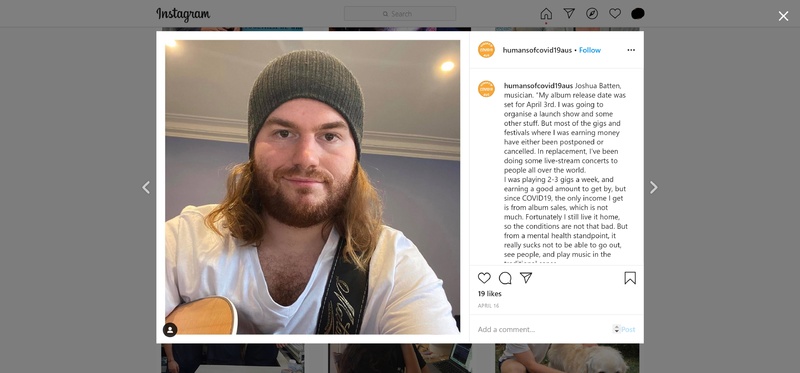 2020-04-16
2020-04-16Humans of Covid-19 AU: Joshua Batten
“My album release date was set for April 3rd. I was going to organise a launch show and some other stuff. But most of the gigs and festivals where I was earning money have either been postponed or cancelled. In replacement, I’ve been doing some live-stream concerts to people all over the world. I was playing 2-3 gigs a week, and earning a good amount to get by, but since COVID19, the only income I get is from album sales, which is not much. Fortunately I still live it home, so the conditions are not that bad. But from a mental health standpoint, it really sucks not to be able to go out, see people, and play music in the traditional sense. We’ve been looking for other options, but I have really had to change course. For many artists, it is incredibly stressful. The government hasn’t offered nearly enough support in our sector. Musicians are also parents, music is their main source of income. And it’s not just the musicians; it’s the behind-the-scenes people too. It’s not a sign of weakness to ask for help. In order to support artists at this time, people can check out the website ‘I lost my gig’, Tipjar or schedule in time just to listen to new music. I think the arts industry will be one of the last things to get back on its feet.” Instagram post on Joshua Batten, musician, and his experience during the pandemic, which was created by a psychology student living in Melbourne who was interested to hear about how COVID-19 was impacting on different peoples’ lives. -
 2020-04-16
2020-04-16Humans of Covid-19 AU: Jesse Burns
“Broadcasting is classified as an essential service, so we still have to work as much, if not more, as before. COVID has changed the entire way we approach stories; in particular, we can’t be close to someone when we interview them. Without being able to shake hands, the interactions can be quite awkward. At first, I think people were struggling. The bushfires were all about a team effort, and that was so fundamental to getting everyone through. But with corona hitting, and the toilet paper saga, it was each man for themselves. This was a big blow to a lot of people. There have been some really somber days, with huge numbers of people losing their jobs overnight. We all felt it. A reminder of our sympathetic, compassionate nature as Australians.” Instagram post on Jesse Burns, journalist, and his experience during the pandemic, which was created by a psychology student living in Melbourne who was interested to hear about how COVID-19 was impacting on different peoples’ lives. -
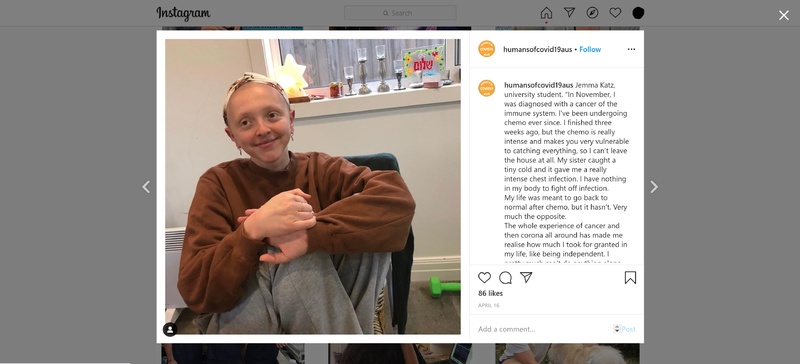 2020-04-16
2020-04-16Humans of Covid-19 AU: Jemma Katz
“In November, I was diagnosed with a cancer of the immune system. I've been undergoing chemo ever since. I finished three weeks ago, but the chemo is really intense and makes you very vulnerable to catching everything, so I can’t leave the house at all. My sister caught a tiny cold and it gave me a really intense chest infection. I have nothing in my body to fight off infection. My life was meant to go back to normal after chemo, but it hasn’t. Very much the opposite. The whole experience of cancer and then corona all around has made me realise how much I took for granted in my life, like being independent. I pretty much can’t do anything alone. I'm 23, and not really living the life of a 23 year old. I've found it helpful to establish a routine. I’m looking forward to being able to do the simple things once this is over, like going for a drive or a walk alone, being able to look after myself.” Instagram post on Jemma, a university student, and her experience during the pandemic, which was created by a psychology student living in Melbourne who was interested to hear about how COVID-19 was impacting on different peoples’ lives. -
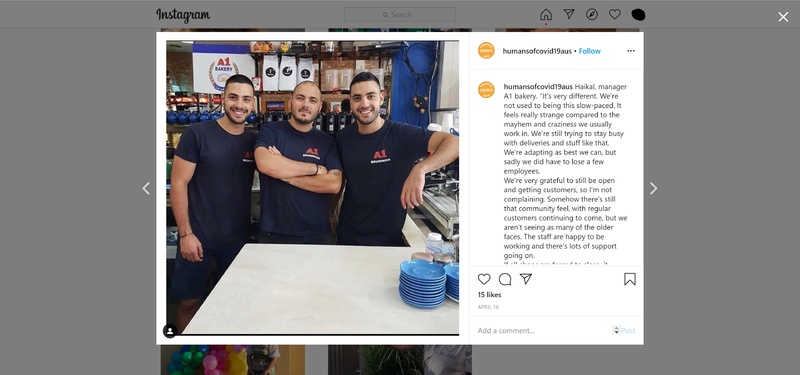 2020-04-16
2020-04-16Humans of Covid-19 AU: Haikal
“It’s very different. We’re not used to being this slow-paced. It feels really strange compared to the mayhem and craziness we usually work in. We’re still trying to stay busy with deliveries and stuff like that. We’re adapting as best we can, but sadly we did have to lose a few employees. We’re very grateful to still be open and getting customers, so I’m not complaining. Somehow there’s still that community feel, with regular customers continuing to come, but we aren’t seeing as many of the older faces. The staff are happy to be working and there’s lots of support going on. If all shops are forced to close, it would affect our family heaps - it's what we do. We’ve been doing it since 1992.” Instagram post on Haikal,, manager A1 bakery, and their experience during the pandemic, which was created by a psychology student living in Melbourne who was interested to hear about how COVID-19 was impacting on different peoples’ lives. -
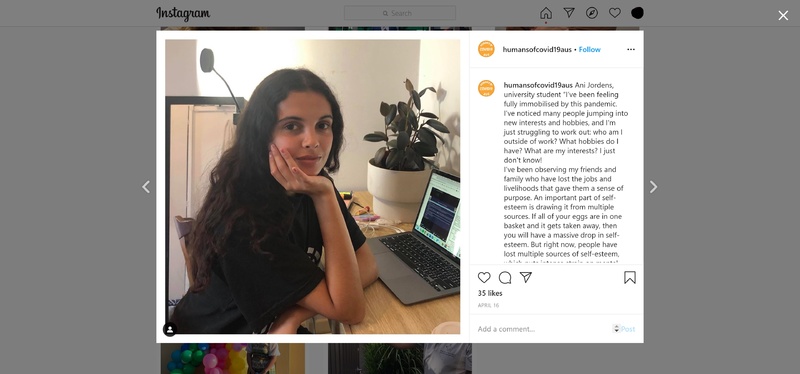 2020-04-16
2020-04-16Humans of Covid-19 AU: Ani Jordens
“I’ve been feeling fully immobilized by this pandemic. I’ve noticed many people jumping into new interests and hobbies, and I'm just struggling to work out: who am I outside of work? What hobbies do I have? What are my interests? I just don't know! I’ve been observing my friends and family who have lost the jobs and livelihoods that gave them a sense of purpose. An important part of self-esteem is drawing it from multiple sources. If all of your eggs are in one basket and it gets taken away, then you will have a massive drop in self-esteem. But right now, people have lost multiple sources of self-esteem, which puts intense strain on mental health. Perhaps we need new structures and more supportive systems. The working-at-home thing has revolutionized able-bodied peoples’ lives, and could be used in a really productive way post-pandemic to make careers more accessible to people with a disability. Hopefully we learn something from this.” Instagram post on Ani Jordens, a university student, and her experience during the pandemic, which was created by a psychology student living in Melbourne who was interested to hear about how COVID-19 was impacting on different peoples’ lives. -
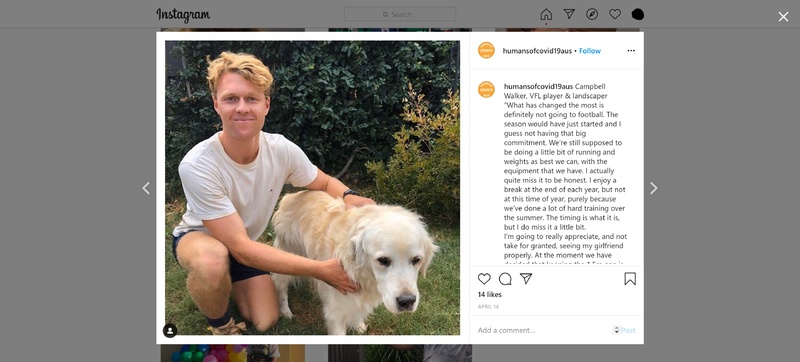 2020-04-16
2020-04-16Humans of Covid-19 AU: Campbell Walker
“What has changed the most is definitely not going to football. The season would have just started and I guess not having that big commitment. We’re still supposed to be doing a little bit of running and weights as best we can, with the equipment that we have. I actually quite miss it to be honest. I enjoy a break at the end of each year, but not at this time of year, purely because we’ve done a lot of hard training over the summer. The timing is what it is, but I do miss it a little bit. I'm going to really appreciate, and not take for granted, seeing my girlfriend properly. At the moment we have decided that keeping the 1.5m gap is the best decision for us. Like we’re still going for a few walks and that, but in terms of actually giving her a big hug when I see her. It’s only been a couple of weeks since we’ve decided to do that, but it’s still pretty rough. I wont take that for granted, and I’ll definitely appreciate that, when the restrictions lift and we’re able to do that again.” Instagram post on Campbell Walker, VFL player & landscaper, and his experience during the pandemic, which was created by a psychology student living in Melbourne who was interested to hear about how COVID-19 was impacting on different peoples’ lives. -
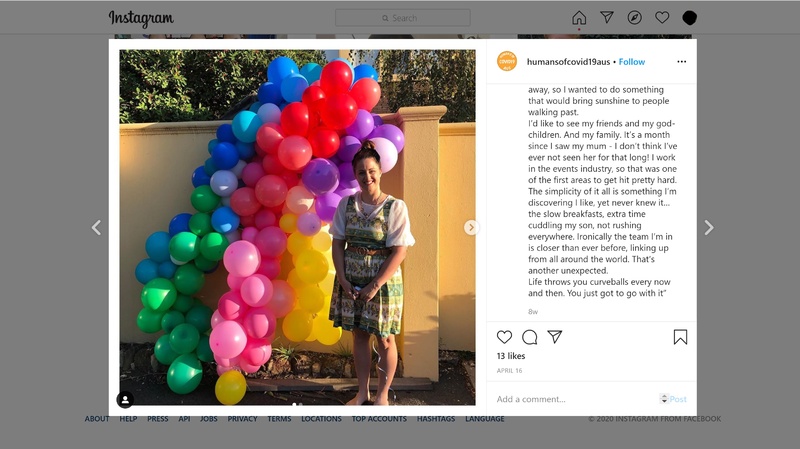 2020-04-16
2020-04-16Humans of Covid-19 AU: Nicole
“Like everyone else, I was feeling a bit gloomy and today is actually the anniversary of my brother passing away, so I wanted to do something that would bring sunshine to people walking past. I’d like to see my friends and my god-children. And my family. It’s a month since I saw my mum - I don’t think I’ve ever not seen her for that long! I work in the events industry, so that was one of the first areas to get hit pretty hard. The simplicity of it all is something I’m discovering I like, yet never knew it… the slow breakfasts, extra time cuddling my son, not rushing everywhere. Ironically the team I’m in is closer than ever before, linking up from all around the world. That’s another unexpected. Life throws you curveballs every now and then. You just got to go with it” Instagram post on Nicole, events, and her experience during the pandemic, which was created by a psychology student living in Melbourne who was interested to hear about how COVID-19 was impacting on different peoples’ lives. -
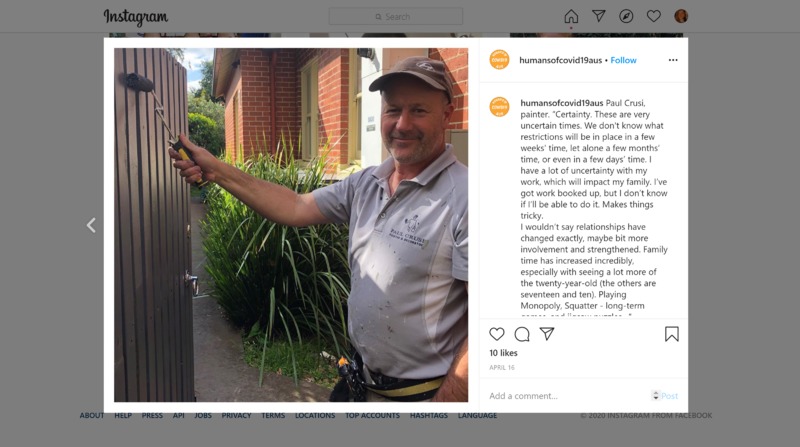 2020-04-16
2020-04-16Humans of Covid-19 AU: Paul Crusi
“Certainty. These are very uncertain times. We don't know what restrictions will be in place in a few weeks' time, let alone a few months’ time, or even in a few days’ time. I have a lot of uncertainty with my work, which will impact my family. I’ve got work booked up, but I don’t know if I’ll be able to do it. Makes things tricky. I wouldn’t say relationships have changed exactly, maybe bit more involvement and strengthened. Family time has increased incredibly, especially with seeing a lot more of the twenty-year-old (the others are seventeen and ten). Playing Monopoly, Squatter - long-term games, and jigsaw puzzles…” Instagram post on Paul Crusi, a painter, created by a psychology student living in Melbourne who was interested to hear about how COVID-19 was impacting on different peoples’ lives. -
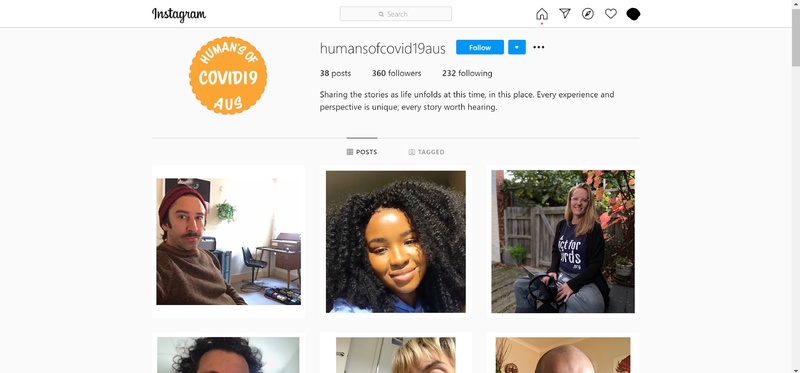 2020-04-16
2020-04-16Humans of Covid-19 Australia
I am a psychology student living in Melbourne, and I was interested to hear about how COVID19 was impacting on different peoples’ lives. So I contacted a broad range of people from different backgrounds and sectors to see how they were tracking and how their lives have been changed by the current state of the world. I then posted anecdotes of the conversation onto an instagram forum @humansofcovid19aus.
